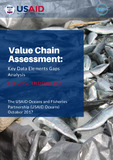Indonesia Value Chain Assessment: Key Data Elements Gaps Analysis
นามธรรม
This report presents a summary of learning site data collection audits, conducted in Bitung, Indonesia, together with a Key Data Element (KDE) gap analysis, and recommendations and solutions for continuous improvement to enable companies to meet and satisfy the traceability requirements of various international import standards such as the European Union (EU) and United States (US). The supply chains audited consisted of one vertically integrated, one semi-vertically integrated, two non-contractual vessel aggregators and one disaggregated independent node supply chains. Categories of supply chains were spread across all three types of gears being considered, i.e., Pole & Line, Handline and Purse Seine. The traceability audits focused on the front end or “first mile” of the supply chain from the point of fishingvessels offloading catch to transfer the first receiver (processor/cold storage), and through to packaging into sealed export freezer containers. Processors and cold storage facilities within this “first mile” where audited with specific focus on operations that source Pole & Line, Handline and Purse Seine product. All sites where chosen by the Indonesia Coastal Tuna Sustainability Alliance (ICTSA). The assessments identified several gaps in KDEs being collected versus those required by various traceability standards, including EU, US, ASEAN Catch Documentation Scheme (ACDS) and the Worldwide Wildlife Fund (WWF), and indicated that all five companies of the selected companies required several improvements before being able to satisfy the standards fully.
การอ้างอิง
USAID Oceans and Fisheries Partnership. (2017). Indonesia Value Chain Assessment: Key Data Elements Gaps Analysis.

